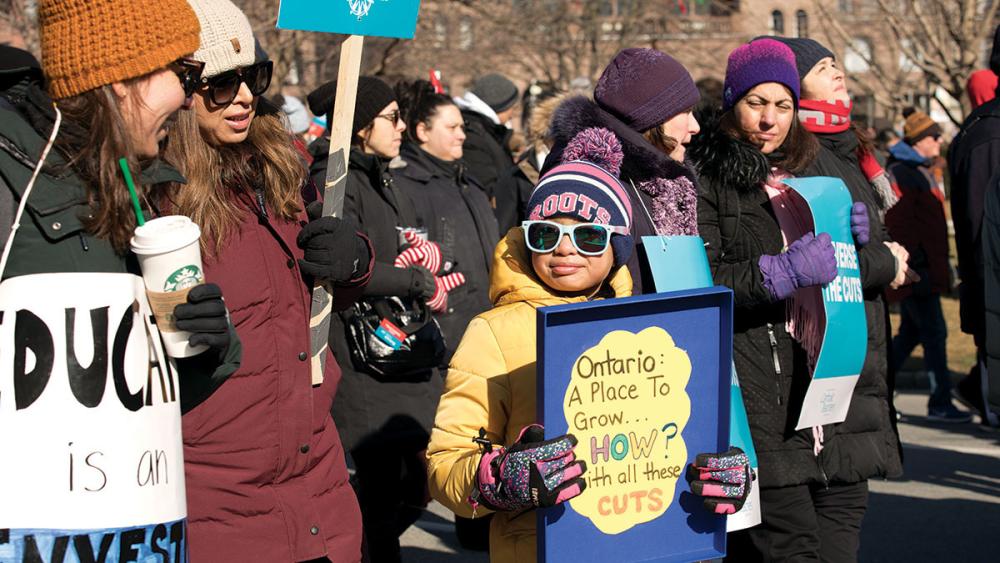
Bargaining ETFO Collective Agreements with the Ford Government
All ETFO collective agreements are set to expire on August 31, 2022. As we prepare for the 2022 round of bargaining, reviewing ETFO’s experience during the previous round of negotiations with the Ford Conservatives and the government’s woefully inadequate pandemic response in our schools is instructive. In looking back, we can see that the Ford government’s agenda has been consistent: defund schools, devalue students, teachers and education workers and degrade public education.
The last three years give us a clear picture of how important it is that the Ford government is defeated in June 2022.
Spring 2019: Ford Signals Cuts to Elementary Education
Prior to the start of bargaining, the Ford government made cuts to education funding for the 2019-2020 school year. Those funding cuts meant secondary class size averages increased significantly, but the Ford government also increased the grades 4-8 class size averages in 13 out of 31 public school boards.
The Ford government also signaled it would be considering additional education funding “efficiencies” (i.e., cuts) in elementary education:
- In March 2019, then-Education Minister Lisa Thompson said the government was “reviewing all of their options” around kindergarten. There were widespread reports that the Ford government was looking to move away from the current kindergarten staffing model of a teacher and a designated early childhood educator (DECE) to save money. The various options being considered by Ford would have resulted in a loss of almost 7,000 ETFO teaching positions or over 2,000 ETFO DECE positions.
- ETFO negotiated special education funding as part of collective agreement extensions in 2017. The funding was used to hire hundreds of additional teachers and education workers to support special education, early years special education needs, Indigenous students, English Language Learners, student well-being and “at risk” learners. When special education funding was eliminated by the Ford government in advance of bargaining, not only were student needs going unmet, a significant number of ETFO teacher and education worker positions were not renewed for the 2019-2022 school year.
- The Ford government indicated it was “seriously examining” possible cuts to sick leave for teachers, long-term occasional teachers and permanent education workers.
Fall 2019: Ford Passes Wage-Suppression Legislation
In November 2019, the Ford government threw a wrench into education sector bargaining by passing the Protecting a Sustainable Public Sector for Future Generations Act, also known as Bill 124. Bill 124 is wage-suppression legislation that targets public sector workers, including teachers and education workers. The bill substantially interfered in the collective bargaining process by limiting negotiated wage increases to a maximum of one percent total compensation per year for three years. Bill 124 ensured that any compensation negotiated for ETFO members during the 2019 round of bargaining would continue to fall behind the rate of inflation.
ETFO and other education sector unions quickly filed a Charter challenge against Bill 124 because it is a direct attack on free collective bargaining and a violation of the Ford government’s duty to bargain fairly and in good faith.
Winter 2019: Ford Government Demands More Cuts During Bargaining
During bargaining, the Ford government demanded ETFO teachers and occasional teachers agree to shoulder the burden of up to $150 million dollars in cuts to elementary education funding. This would have amounted to a serious erosion of ETFO teacher and occasional teacher members’ collective agreement entitlements as well as funding designated for elementary students and schools.
ETFO asked for funding that would maintain appropriate health benefits levels for members. Instead, the government’s offer was far below what would have been required to sustain benefits at their current level. That would have resulted in an erosion of funding for member benefits.
The Ford government and the school board association’s proposals around occasional teacher hiring under Ontario Regulation 274 included removing central agreement language on hiring and eroding seniority provisions. ETFO refused to agree to language in the central agreement that would have eroded occasional teacher hiring based on seniority and qualifications.
In November 2020, following the 2019 round of bargaining, the government showed its true colours by revoking Regulation 274 while many ETFO locals were still engaged in local bargaining for a 2019-2022 collective agreement. ETFO filed bad faith labour bargaining complaints with the Ontario Labour Relations Board (OLRB) against this action. In June 2021, ETFO won its first OLRB complaint; the win required 17 school boards, still at local bargaining tables, to continue to staff hiring positions for occasional teachers under the rules set by Regulation 274. ETFO is currently pursuing its second bad faith bargaining complaint against the Ford government at the OLRB on the basis that the government’s unexpected elimination of Regulation 274 after central bargaining amounted to bargaining in bad faith.
ETFO Members Stood Up and the Government Withdrew Its Bargaining Strips
During the 2019 round of bargaining, ETFO members fought back against the Ford government through work-to-rule and full-scale withdrawal of services. Because of the solidarity of our members, the government withdrew its demands for strips to elementary education, sick leave and benefits. ETFO obtained a legally-binding, enforceable commitment from the Ford government to maintain the current kindergarten model until August 2022. ETFO also preserved elementary class size language in local collective agreements and was able to renew special education funding to support the hiring of additional teachers and education workers.
But if the Ford government remains in power as we move into the 2022 round of bargaining, ETFO members may find themselves, yet again, having to protect education funding and collective agreement entitlements against a government that does not see the value in public education and does not respect the professionalism of teachers and education workers.
The Ford Government's Inadequate Pandemic Response in Schools
Throughout the pandemic, it has been clear that the Ford government will not prioritize investments in the supports students need, as demonstrated by their lack of concern with pandemic inequities – for example, equitable access to technology for students and educators.
In response to the COVID-19 pandemic, the Ford government was advised by unions, boards, parent groups and public health experts to reduce class sizes to allow for appropriate physical distancing. Class size reduction should have been an important strategy for keeping schools open during the pandemic. Instead, the Ford government obstinately refused to reduce class sizes, even voting unanimously against a motion in the Ontario Legislature that would have capped class sizes at 15 during the pandemic. If the Ford Conservatives will not reduce class sizes in the face of a global pandemic to keep students safe, it is unlikely that class size reductions will be a priority for them during the 2022 round of bargaining.
Health and safety issues have been at the forefront of discussions in public education for some time. The global pandemic has brought many of these issues into even sharper focus as air quality and ventilation in schools have become front-of-mind concerns. As we came to understand that COVID-19 is airborne and inadequate ventilation can be a driver of infection, the Ford government’s response has been both inadequate and too late. In late 2021, elementary-aged children were contracting COVID-19 at a rate far greater than that of the remainder of the population. The mental health of education workers during the pandemic has also been a challenge, with widespread stress and burnout. These realities have been ignored by the Ford government.
It appears that the Ford government is moving to institute virtual learning as a permanent fixture of public education in the name of “modernization.” Teachers have been forced to “pivot” their programming without support through professional development, reliable access to internet or, in some cases, devices. The lack of adequate funding has meant some school boards have adopted a “hybrid” learning model, which means teachers and education workers provide instruction and support to students both in-person and online simultaneously. This is a problematic, inferior model of delivering public education that ETFO opposes.
What Can We Expect for 2022 Bargaining?
When they were elected, there were suspicions that the Ford government had an agenda of prioritizing cuts to public education and pursuing privatization. Those suspicions have merit. The March 2021 budget included $1.6 billion in cuts to education spending. At current funding levels, the Financial Accountability Office predicts a $12.3 billion spending gap in education by 2029-2030.
At the outset of the pandemic, the government hired McKinsey and Company, a private consultancy firm, to help them manage its pandemic reopening plan. McKinsey’s report urges public school boards to partner with private companies to provide education services and reduce costs.
Throughout the 2019 round of bargaining, the government tried to erode the working conditions of ETFO members and the learning conditions of elementary students. ETFO preserved and protected entitlements due to the resolve and solidarity of our members. But the evidence is clear. Allowing the Ford government a second mandate in June 2022 will do two things: it will make the 2022 round of bargaining as difficult as the 2019 round, and it will clear a pathway to privatizing Ontario’s world-class public education system.
The 2022 round of bargaining will be crucial to preserving high-quality public education in Ontario. Given their approach over the last three years to education sector bargaining and to dealing with the pandemic in public schools, if we are forced to negotiate with the Ford Conservatives again, we will be bargaining across the table with a government that has set its sights on continuing cuts, on continuing degradation of the professionalism of ETFO members and on advancing privatization in public education. To protect public education and to protect working and learning conditions, we must work together to ensure that the Ford Conservatives are a one-term government.
Keep in Touch with the 2022 Round of Bargaining
- Contact ETFO at memberrecords@etfo.org and make sure the Federation has your up-to-date email address, phone number and home address.
- Follow bargaining news and events on ETFO’s Collective Bargaining Website (etfocb.ca) and the ETFO CB eNewsletter.
- Check bargaining updates on ETFO’s Twitter and Facebook accounts.
Heather Aggus is a member of the ETFO executive staff.

